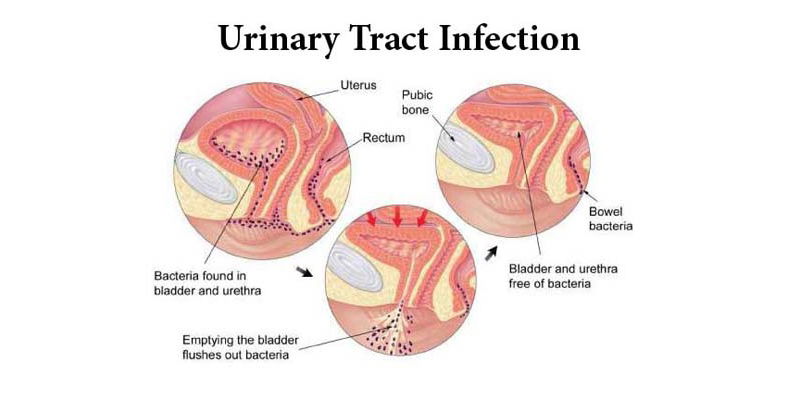Keepers at Home-Urinary Tract Infection

What is a Urinary Tract Infection?
A urinary tract infection (UTI) is an infection in any part of the urinary system. The urinary system includes the kidneys, ureters, bladder and urethra. Most infections involve the lower urinary tract — the bladder and the urethra.
Women are at greater risk of developing a UTI than are men. If an infection is limited to the bladder, it can be painful and annoying. But serious health problems can result if a UTI spreads to the kidneys.
UTIs don't always cause symptoms. When they do, they may include:
- A strong urge to urinate that doesn't go away
- A burning feeling when urinating
- Urinating often, and passing small amounts of urine
- Urine that looks cloudy
- Urine that appears red, bright pink or cola-colored — signs of blood in the urine
- Strong-smelling urine
- Pelvic pain, in women — especially in the center of the pelvis and around the area of the pubic bone
In older adults, UTIs may be overlooked or mistaken for other conditions.
Types of Urinary Tract Infections:-
Each type of UTI may result in more-specific symptoms. The symptoms depend on which part of the urinary tract is affected.
| Part of urinary tract affected | Signs and symptoms |
|---|---|
| Kidneys |
|
| Bladder |
|
| Urethra |
|
When treated promptly and properly, lower urinary tract infections rarely lead to complications. But left untreated, UTIs can cause serious health problems.
Complications of a UTI may include:
- Repeated infections, which means you have two or more UTIs within six months or three or more within a year. Women are especially prone to having repeated infections.
- Permanent kidney damage from a kidney infection due to an untreated UTI.
- Delivering a low birth weight or premature infant when a UTI occurs during pregnancy.
- A narrowed urethra in men from having repeated infections of the urethra.
- Sepsis, a potentially life-threatening complication of an infection. This is a risk especially if the infection travels up the urinary tract to the kidneys.
Prevention and Home Remedies for Urinary Tract infections:-
These steps may help lower the risk of UTIs:
- Drink plenty of liquids, especially water. Drinking water helps dilute the urine. That leads to urinating more often — allowing bacteria to be flushed from the urinary tract before an infection can begin.
- Try cranberry juice. Studies that look into whether cranberry juice prevents UTIs aren't final. However, drinking cranberry juice is likely not harmful.
- Wipe from front to back. Do this after urinating and after a bowel movement. It helps prevent the spread of bacteria from the anus to the vagina and urethra.
- Empty your bladder often and soon after having sex. Also drink a full glass of water to help flush bacteria.
- Avoid potentially irritating feminine products. Using them in the genital area can irritate the urethra. These products include deodorant sprays, douches and powders.
- Eating garlic. It turns out that garlic doesn’t just ward off vampires. A recent study showed that garlic extract may be effective in reducing the bacteria that cause UTIs.
- Add Vitamin C to your diet. Not only does vitamin C help strengthen your immune system, but it may also acidify your urine, which limits the growth of some bacteria and may prevent urinary tract infections from occurring. Just be careful of eating too many acidic foods when you have a UTI, as they can potentially irritate your bladder, which may only make your UTI symptoms worse. This is a great home remedy for UTIs and one that can benefit your whole body.
- Change soaps. Your body wash, bubble bath, and other cleaning supplies can be to blame for your UTIs. Use fragrance- and dye-free sensitive formulations.
- Regularly replace menstrual cups, tampons, and pads. Synthetic, low-absorbency pads raise your risk of infection by exposing your vulva to microorganisms. Tampon usage might enable bacteria to reproduce more quickly, thus it’s crucial to change them frequently. If used improperly, tampons and menstrual cups might raise your risk of developing or aggravating a UTI. Bacteria may move to the bladder if it presses on your urethra and becomes trapped by your pee. A menstrual cup’s size or shape can be altered to help avoid reoccurring UTIs.
- Avoid certain foods: Some foods may irritate your bladder and urinary tract, such as alcohol, caffeine, artificial sweeteners.
- Add D-mannose to your diet. D-mannose is a type of sugar that is found in cranberries and other fruit. Similar to other home remedies on our list, it may be able to prevent harmful bacteria from adhering to your urinary tract. You can add D-mannose to your diet by upping your intake of blueberries, cranberries, apples, peaches, broccoli and green beans.



